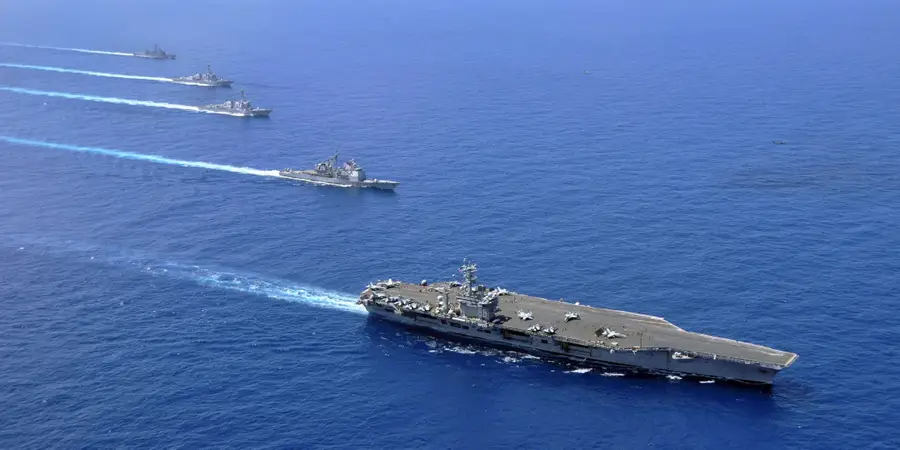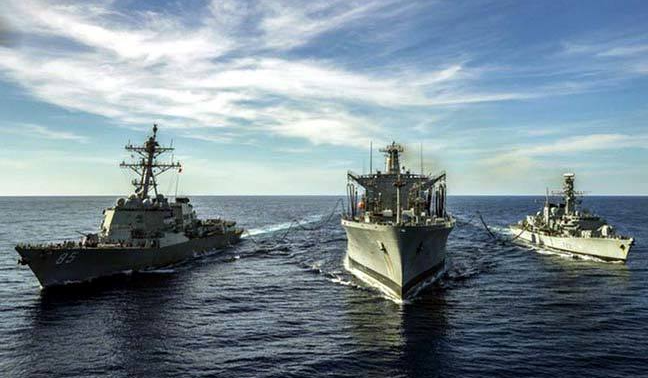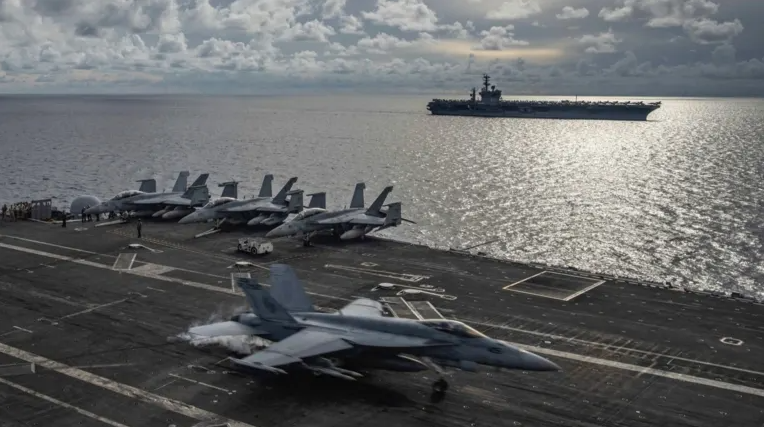Philippine President strongly defends court ruling against China in UN speech
![In his more than four years in office, it was the first time that Duterte addressed the UN body, which marks its 75th anniversary this year [Manuel Elias/UN via AFP] 4348 philippine president](https://vietnamtimes.org.vn/stores/news_dataimages/phamhuongvnt/092020/25/07/in_article/4348_Philippine_President.png?rt=20200925082058) |
| In his more than four years in office, it was the first time that Duterte addressed the UN body, which marks its 75th anniversary this year. Photo: AFP |
Philippine President Rodrigo Duterte voiced strong support for a Hague ruling rejecting most of China’s claims to South China Sea (Bien Dong Sea) in his first-ever address to the United Nations General Assembly.
In a pre-recorded speech delivered to the opening of the 75th session of the General Assembly on September 22, Duterte reaffirmed the outcome of the case, which was issued by the Permanent Court of Arbitration (PCA) in The Hague.
“The award is now part of international law, beyond compromise and beyond the reach of passing governments to dilute, diminish, or abandon,” Duterte said in the speech.“We firmly reject attempts to undermine it.”
The claim was filed with the PCA by the previous administration of President Benigno Aquino in 2013, following a lengthy stand-off with China over Scarborough Shoal, which ended with Beijing in effective control of the strategic reef.
In July 2016, the tribunal issued a ruling rejecting the legal basis for nearly all of China’s expansive maritime and territorial claims in the South China Sea. In particular, it determined that China’s “nine-dash line” maritime claim was inconsistent with the United Nations Convention on the Law of the Sea (UNCLOS), and that Beijing had violated the Philippines’ sovereign rights within the latter’s 200-nautical-mile Exclusive Economic Zone, according to The Diplomat.
Broader hardening of the Philippines’ position on the maritime disputes
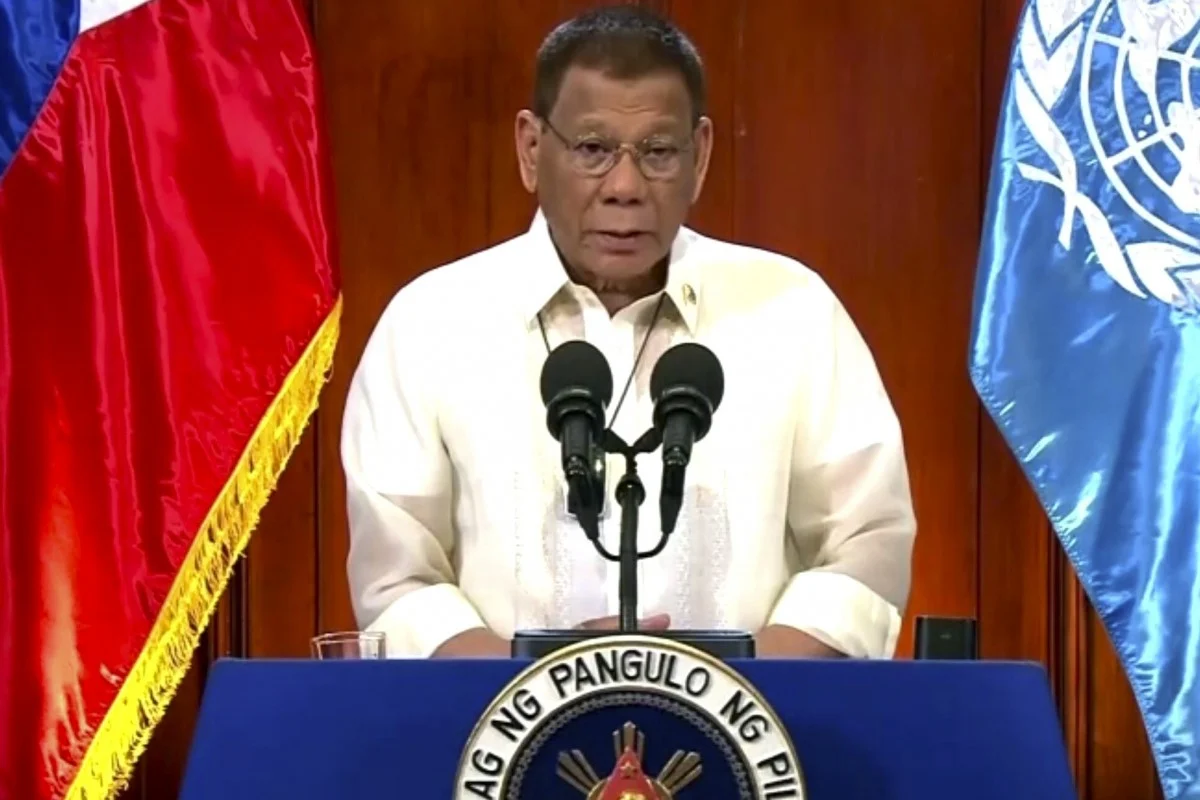 |
| Rodrigo Duterte, President of the Philippines, speaks in a pre-recorded message that was played during the 75th session of the United Nations General Assembly on September 22. Photo: UNTV via AP |
Duterte’s strongly worded speech, filled with references to “the majesty of the law,” represents an abrupt reversal of his initial reaction to the ruling, which was handed down shortly after he took office in 2016. Downplaying the legal victory, he opened direct talks with President Xi, hoping to tap Beijing for badly needed infrastructure funding.
It also reflects a broader hardening of the Philippines’ position on the maritime disputes. In July, the fourth anniversary of the issuance of the award, the Philippines Department of Foreign Affairs issued a statement acknowledging it officially for the first time.
In the statement, Foreign Affairs Secretary Teodoro Locsin described it as being “of great significance and consequence to the peaceful settlement of disputes in the South China Sea and to the peace and stability of the region at large.”
On September 21, Locsin augmented this by affirming that any Code of Conduct negotiated with China would ensure a continued Western presence in the South China Sea.
“I can swear to you, Western powers will be in the South China Sea,” he told lawmakers in Manila. “We believe in the balance of power, that the freedom of the Filipino people depends on the balance of power in the South China Sea.”
The strengthening of the Philippine line has been paralleled by an increasing international alignment behind the arbitral award.
On July 13, U.S. Secretary of State Mike Pompeo announced an important shift in U.S. policy on the South China Sea. The policy essentially aligned the U.S. position with the PCA ruling, and for the first time described specific Chinese maritime claims as “illegal” under UNCLOS, although the U.S. is yet to ratify the treaty.
In the months since, other Western powers including France, Germany and the United Kingdom have all voiced their support for the ruling, along similar lines to the U.S.
In his speech to the U.N., Duterte welcomed “the increasing number of states that have come in support of the award and what it stands for – the triumph of reason over rashness, of law over disorder, of amity over ambition.”
What gives?
So what could be behind the apparent turnaround? Why did Duterte assert the Hague ruling now after years of saying he was still waiting for the right moment? After he warned that raising it could goad China into war?
Rapper pointed to the five factors that could have played a part in events.
1. Locsin
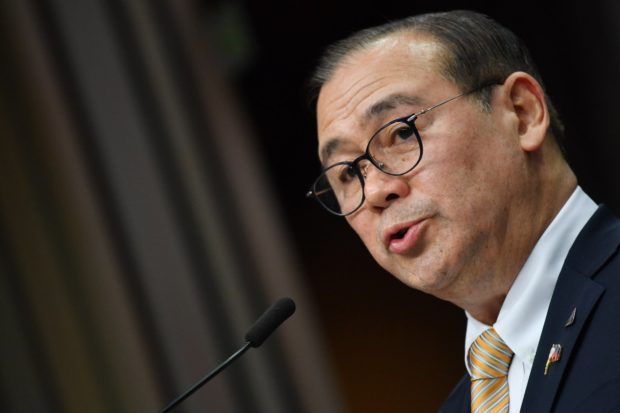 |
| Philippine Foreign Secretary Teodoro Locsin Jr. Photo: AFP |
Diplomats who observed Duterte’s speech note that the strongest declarations about the Hague ruling carry the unmistakeable imprints of Philippine Foreign Secretary Teodoro "Teddyboy" Locsin Jr.
The “beyond compromise” portion likely came from him. Duterte’s UN speech would have included inputs from the Department of Foreign Affairs (DFA), led by Locsin. Let’s not forget that the DFA chief, infamous for his verbose, no-holds-barred tweeting, had served as speech writer for 3 Philippine presidents.
Even when Locsin was the country’s permanent representative to the United Nations, a post assigned to him by Duterte, he was already actively but quietly challenging China’s posturing within the international body.
Locsin became foreign secretary in late 2018, replacing Alan Peter Cayetano, now House Speaker who had never held a diplomatic post and was less assertive in public about China’s encroachments in the West Philippine Sea.
2. Recent efforts by China to undermine Hague ruling
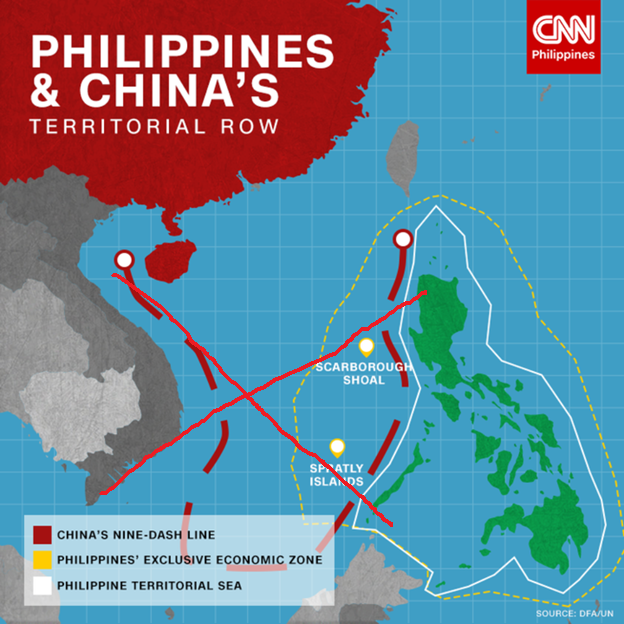 |
| In July 2016, the tribunal issued a ruling rejecting the legal basis for nearly all of China’s expansive maritime and territorial claims in the South China Sea. Photo: CNNPhilippines |
Duterte’s bombshell remarks can be viewed in another way: not as the start of a new shift in policy but just the loudest indication of changes that have been afoot for a while now.
Diplomats Rappler spoke with say that the stronger pushback against China began in 2019 and escalated to protest notes issued by the DFA this year.
In April 2019, Duterte surprised even Philippine diplomats when he went off-script during a meeting with Chinese President Xi Jinping to “remind” him of the Hague ruling.
Later that year, in December, China issued a note verbale reiterating its “Four Sha” claim, a “legal theory” used by China, in reaction to the arbitral award, as basis for its sovereignty and maritime claims in the South China Sea. In the “Four Sha” doctrine, China claims that 4 island groups in the South China Sea, including the Spratly, are enclosed in a single archipelagic system that generates its own maritime zones China is entitled to.
This position contradicts the United Nations Convention on the Law of the Sea (UNCLOS) which China itself is party to.
China’s note verbale triggered a flurry of protests from other countries with claims in the South China Sea, like Vietnam and Malaysia in the months of May to August this year.
While the Duterte government did indeed profess an inclination for bilateral talks with China to appease the powerful and wealthy neighbor, the multilateral route was never completely shelved.
In the face of unilateral actions by a country, Philippine diplomats have always recommended turning to multilateral platforms like the UN.
3. Escalating US-China rivalry
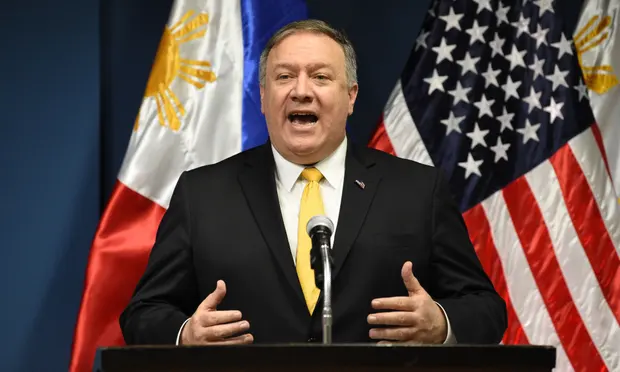 |
| Mike Pompeo in Manila, where he said the US will defend Philippine vessels in the South China Sea. Photo: AFP |
A source says another factor in the timing of Duterte’s remarks is the growing tensions between the US and China, world powers with which the Philippines has special ties.
The US has been upping the ante in its South China Sea policy to challenge China’s bid for dominance there. In March last year, Secretary of State Mike Pompeo issued a much-awaited assurance that the US would come to the Philippines’ aid if China were to attack any Philippine vessel in the South China Sea. This July, the Western power renewed its warning that any Chinese occupation of Panatag (Scarborough) Shoal would have “severe consequences.” This likely emboldened Locsin to say a month later that he would call on America should China attack Philippine forces.
Batongbacal thinks that Philippine officials might be perceiving a "real possibility of Chinese action” in the South China Sea.
“Siding with the external powers on this issue may be the only substantial contribution the Philippines can make in discouraging any adventurism on China’s part,” he said.
A “nervous” Philippine military, a sector Duterte listens to, would surely add to the growing calls for action against China’s continued aggression, said Batongbacal.
Amidst the US-China power play, the Duterte government wants to maintain a “strategic autonomy” between China and the US that allows the Philippines to push back on sovereignty issues. The Duterte administration’s affirmation of the Hague ruling is its challenge to China, just as its repudiation of human rights resolutions is its challenge to the US and the European Union.
The Philippines’ Ambassador to China, Chito Santa Romana, described Duterte’s UN speech as an “excellent articulation of the administration’s independent foreign policy.”
“It reflects the strategic approach of supporting the UN at a time of escalating global tensions,” he told Rappler.
4. How about China's vaccine?
Is Duterte’s obsession with a COVID-19 vaccine coloring his foreign policy? Why risk antagonizing China, a possible source of a vaccine? But this might not be as big a factor as some would think.
I think the President considers the bilateral relations as strong enough to withstand such differences. And we will continue to discuss and manage these differences if we cannot resolve them right away," Sta Romana said.
The strength of his Hague ruling remarks are cushioned by the fact that he had already personally raised the Hague ruling with Xi in their meetings, heard and accepted Xi’s position on the matter.
With Philippine diplomats consistently mentioning the Hague ruling in fora like bilateral consultations and Association of Southeast Asian Nations (ASEAN) meetings, it would have been an anomaly if Duterte were to leave out the arbitral award in his UN speech. Besides, China is not the only source of a coronavirus vaccine. Duterte officials are in talks with Russian, American, and European suppliers.
5. 2022 elections
Domestic politics could also be one consideration of the move, according to Batongbacal. Filipinos will be voting for a new president in 2022, when Duterte is scheduled to step down.
Perhaps the administration senses that strong remarks against China could “blunt criticism” and play to the overwhelming sentiment of Filipinos that the government should fight for Philippine rights in the West Philippine Sea. /.
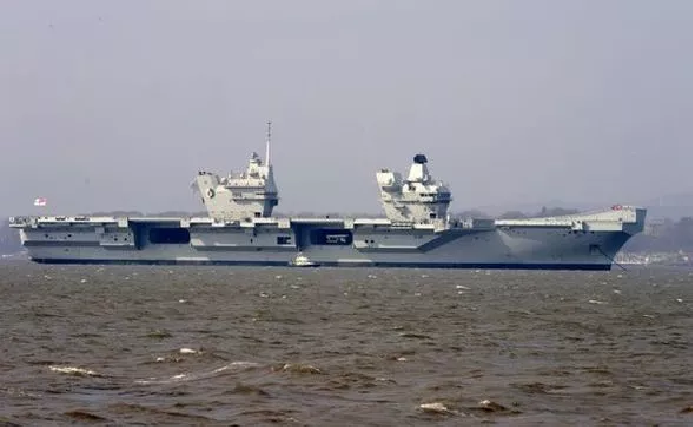 | UK defence ministry urged to send HMS Queen Elizabeth into South China Sea (Bien Dong Sea) The UK Ministry of Defence has been urged to send HMS QueenElizabeth into South China Sea (Bien Dong Sea) on her first operational mission next ... |
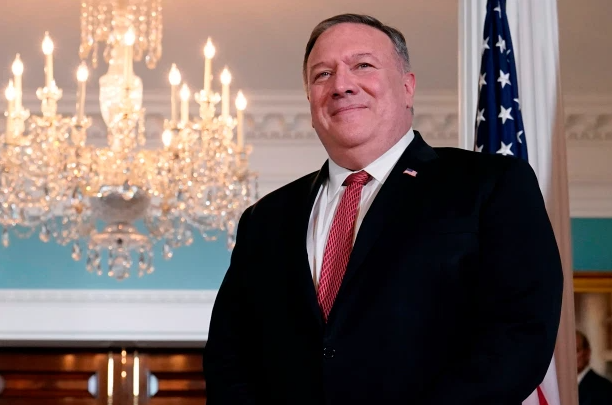 | US to ASEAN: Reconsider deals with China firms which build facilities on Bien Dong Sea U.S. Secretary of State Mike Pompeo asked Southeast Asian nations Thursday to reconsider deals with Chinese companies blacklisted by Washington for building island outposts. |
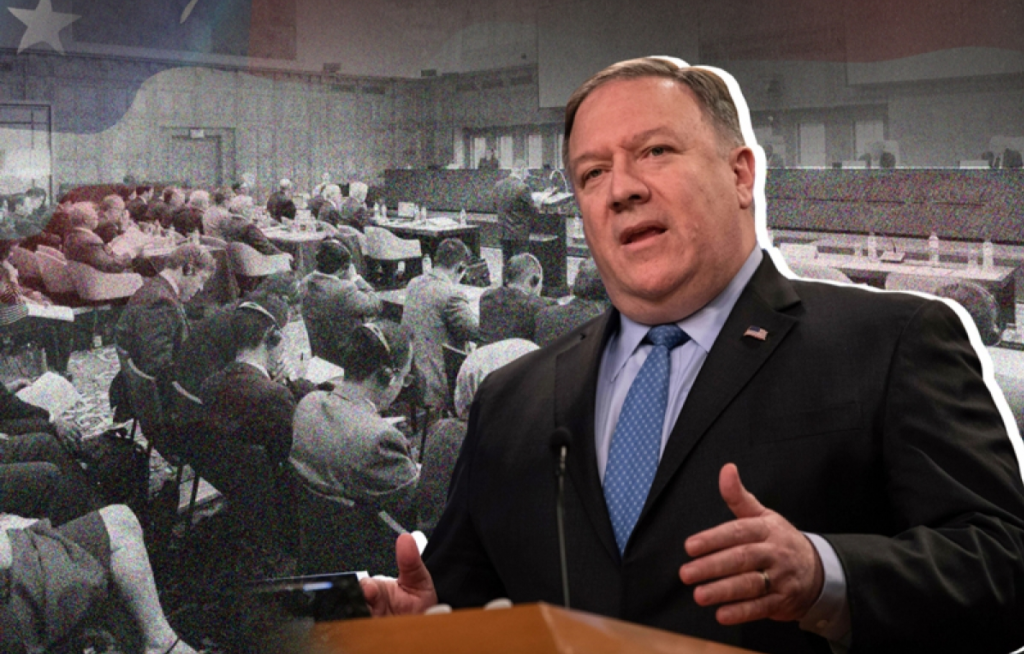 | China's unlawful claims on Bien Dong Sea faces strong international opposition China’s South China Sea sovereignty claims have endured strong criticism from various countries globally, including the United States and Australia, which state that these claims ... |
Recommended
 World
World
Pakistan NCRC report explores emerging child rights issues
 World
World
"India has right to defend herself against terror," says German Foreign Minister, endorses Op Sindoor
 World
World
‘We stand with India’: Japan, UAE back New Delhi over its global outreach against terror
 World
World
'Action Was Entirely Justifiable': Former US NSA John Bolton Backs India's Right After Pahalgam Attack
 World
World
Nifty, Sensex jumped more than 2% in opening as India-Pakistan tensions ease
 World
World
Easing of US-China Tariffs: Markets React Positively, Experts Remain Cautious
 World
World
India strikes back at terrorists with Operation Sindoor
 World
World

